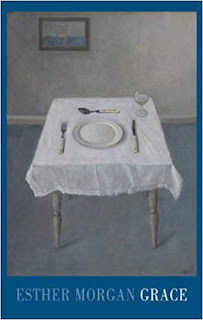Tuesday Poem: This Morning by Esther Morgan
I watched the sun moving round the kitchen,
an early spring sun that strengthened and weakened,
coming and going like an old mind.
I watched like one bedridden for a long time
on their first journey back into the world
who finds it enough to be going on with:
the way the sunlight brought each possession in turn
to its attention and made of it a small still life:
the iron frying pan gleaming on its hook like an ancient find,
the powdery green cheek of a bruised clementine.
Though more beautiful still was how the light moved on,
letting go each chair and coffee cup without regret
the way my grandmother, in her final year, received me:
neither surprised by my presence, nor distressed by my leaving,
content, though, while I was there.
© 2010, Esther Morgan
Bridport Prize-winner, 2010
From: Grace
Publisher: Bloodaxe Books, 2011
Everyone complains about Facebook, but without it I'd miss a lot of good reading. One of my FB friends mentioned Esther Morgan with such enthusiasm I set off to find her. I bought Grace second hand (sorry!) and sat up half the night reading it. How could I have missed such a good poet? These are poems that are both delicate and strong. There are lines I would kill for. Seamus Heaney once said that poetry is not a gift, or a craft, but a 'grace' and there is an echo of that in the title, though the cover image suggests something more conventional.
The poetry contains a darker message - 'what we may be about to receive' when we spread our lives 'out like a cloth' may not be quite what we want or expect. The title poem brings to life 'the moment the house empties like a city in August' and that watchful stillness that feels like a prelude:
... simple, though not easy
this waiting without hunger in the near dark
for what you may be about to receive.
Alison Brackenbury, reviewing Grace wrote: 'Esther Morgan's third collection, is an extraordinary, radiant book. Its poetry makes quietly insistent demands upon the reader: "In the stillness, everything becomes itself."... The afterglow of Esther Morgan's luminous work is not certainty, but questions. Can imagination transform, or simply recognise, what is there? Do these poems come by grace of Muse or angel?’ – Alison Brackenbury, Poetry London.
This quiet, contemplative 'register' of poetry, like that of Mary Oliver's, is not always to my taste - I tend to go for something bolder, salty rather than sweet, but Grace surprised me (as Oliver sometimes does) by achieving a real complexity - a kind of gourmet morsel on the tongue, whose flavour you can't quite identify, that leaves you wanting more.
Esther Morgan's new collection (the first in 7 years) is called The Wound Register, a title taken from the official record of the casualty and sickness details for more than fifteen thousand soldiers of the Norfolk Regiment during the First World War. Released presumably to celebrate the centenary of WWI, the poems apparently: "apply the concept to her own family history in the aftermath of her great-grandfather’s death at the Somme." It contains, according to the blurb, "an unflinching sequence written to her grandmother which explores the trauma of losing a father in combat, while other poems address the missing soldier directly as he hovers on the brink of living memory". I'm definitely going to be seeking this out.



Thank you so much for this lovely post - this poem just made my day the way it gently draws you in from moment to moment on its journey into and round the kitchen - I love the simplicity in everyday things that take you deep into an emotional journey beyond - it has inspired me to get cracking on my poems the ones I’ve been putting on hold for the more peaceful holidays and now we’re two werks in and still haven’t started so today’s the day :) Plus I’m very excited to read more of Esther Morgan’s poetry!
ReplyDeleteIt is lovely isn't it. Like you, I'm now looking for more of Esther's work.
Delete